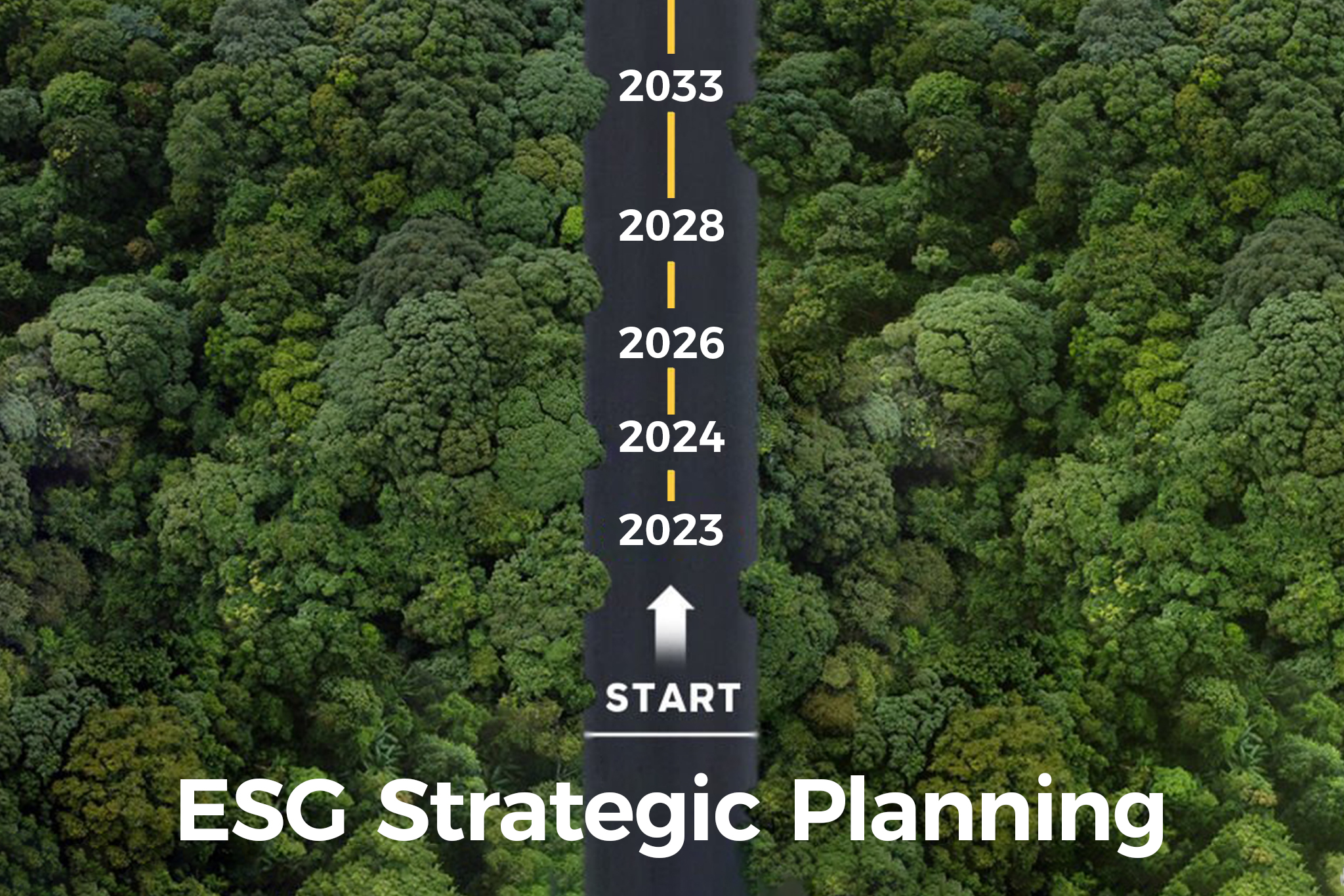Today's business environment encourages organizations to operate sustainably and responsibly, which is why corporations must have a well-thought-out environmental, social, and governance (ESG) strategy.
Navigating the ESG landscape can be daunting for businesses, but the benefits of developing an ESG strategy are undeniable.
This guide will provide you with the tools you need to develop a comprehensive ESG strategy that aligns with your business goals and values while positively impacting society and the environment.
What Is an ESG Strategy?
An ESG strategy is a set of guidelines and principles that a company or organization follows to address environmental, social, and governance issues in its operations and investments. These issues include climate change, labor rights, and corporate governance.

The goal of an ESG strategy is to create long-term value for the company or organization, its stakeholders, and society. This can be done by identifying and managing risks and opportunities related to ESG issues and integrating ESG considerations into decision-making processes.
Why Do Businesses Need an ESG Strategy?
While businesses are primarily driven by profit, most of today’s investors are more socially conscious than ever. Corporate ESG strategies are a response to the demands of these socially conscious investors and shareholders who want to see businesses generate financial returns and positively impact the world.
Here’s an interesting read on how to get started with environmental, social, and governance ESG investing.
Businesses need an ESG strategy for several reasons. Here are a few:
Risk Management
ESG issues can pose significant risks to a company's operations and reputation, such as regulatory changes, natural disasters, and social unrest. An ESG strategy can help a company identify and manage these risks.
Reputation and Brand Value
Companies with strong ESG profiles are often seen as more trustworthy and responsible by consumers, investors, and other stakeholders. This can help to improve a company's reputation and brand value.
Long-term Value Creation
An ESG strategy can help a company create long-term value by identifying and taking advantage of opportunities related to environmental and social issues.
Compliance with Laws and Regulations
An ESG strategy can help a company comply with laws and regulations related to environmental and social issues.
Attracting Investment
As an increasing number of investors consider a company's impact on society and the environment when making investment decisions. Companies with robust ESG strategies are more likely to attract investment.
Meeting Customer's Expectations
Having an ESG strategy in place can help companies meet the increasing demand from customers who want to support businesses committed to contributing to a better future.
Unlock Your Company’s Business Potential Through Knowledge Ridge’s Comprehensive ESG Strategy
With access to highly qualified professionals worldwide, Knowledge Ridge connects businesses with experienced ESG experts to help craft a customized ESG plan aligned with the organization’s broader strategies and goals.
Here’s how Knowledge Ridge helps organizations make a robust ESG strategy:
Identifying Key ESG Issues
Knowledge Ridge helps form a corporate ESG strategy that aligns with the fundamental goals that matter to the organization, its investors, and its stakeholders. This assessment will help companies adopt the relevant ESG practices and strategies based on their industry and business model.
Here’s a list of the most relevant high-impact ESG issues:
-
- Environmental
Climate change, Greenhouse gas emissions (GHG), deforestation, biodiversity, pollution, water, waste, extended producer responsibility
-
- Social
Customer relations, employee relations, labor, human rights, occupational health and safety, community relations, supply chains
-
- Governance
Board management practices, succession planning, compensation, diversity, equity and inclusion, regulatory compliance, corruption, fraud, data hygiene and security
Setting Goals and Targets
Any ESG strategy will remain vague without definite ESG goals to work towards. Establishing specific, measurable, achievable, relevant, and time-bound (SMART) ESG goals will eliminate ambiguity from an ESG strategy.
Here’s a breakdown of SMART ESG goals:
-
- Specific
Explicit, unambiguous declarations of ESG goals and how these goals are to be met. - Measurable
The incorporation of quantifiable benchmarks to track progress towards ESG goals. - Achievable
Setting realistic ESG goals that can be achieved with the available expertise and technology. - Relevant
Setting ESG goals that are aligned with an organization’s key objectives. - Time-bound
Setting deadlines and accountability metrics within which to achieve specific ESG goals.
- Specific
Developing a Strategic ESG Roadmap
A comprehensive sustainability plan can guide an organization’s ESG strategy over the years by detailing the steps needed to achieve established goals in a specific timeline.
Specifying the various phases of an ESG strategy can paint a clear picture for stakeholders, boost the organization’s sustainability performance, and is an integral part of turning their sustainability vision into a reality.
A thorough ESG roadmap should detail an organization’s various sustainability initiatives, resources, and actions and help to establish a workable ESG framework.
Communicating and Reporting
Transparency in communications with shareholders, employees, customers, and the community when reporting ESG performance is an excellent way to attract potential investors.
Accurate ESG reporting also improves brand image among the general public and can help a business stand out among its competition.
Reviewing and Adjusting ESG Goals and Strategies
The ESG strategy of a company is not something that can be implemented once and then ignored.
For a long-term sustainability plan to retain its relevance and effectiveness, it must be regularly reviewed, adjusted, updated, and nurtured. This ensures that the organization’s ESG objectives and activities consistently align with stakeholder and investor expectations.
The Knowledge Ridge Advantage
The role of corporate boards in ESG monitoring is gaining momentum as businesses choose this approach to help them navigate an increasingly competitive and uncertain business landscape and bridge the gap between strategic goals and implementation.
Knowledge Ridge has access to custom-vetted experts in ESG-related fields, data, and analytics tools to measure and track performance, share best practices, and collaborate on ESG initiatives.
By leveraging the Knowledge Ridge advantage, an organization can better understand and address the ESG risks and opportunities they face and ultimately improve their overall sustainability and reputation.
Knowledge Ridge's executive and board placement services can help organizations identify and recruit qualified, experienced directors with expertise in ESG to serve on their boards. This can provide the organization with the necessary governance oversight to ensure the successful implementation and maintenance of its ESG strategy.
Reach out to us to learn how your organization can develop and implement a robust ESG strategy aligned with your business objectives while ensuring that you meet your regulatory and stakeholder expectations.
Frequently Asked Questions
What are the three principal ESG strategies?
The three main ESG (Environmental, Social, and Governance) strategies are:
- Negative screening: avoiding investments in companies or industries with negative ESG practices or impacts.
- Best-in-class or positive screening: investing in companies with superior ESG practices relative to their peers in each industry.
- ESG integration: incorporating ESG factors into the financial analysis and investment decision-making process alongside traditional financial metrics.
What are the main ESG reporting frameworks?
The main ESG reporting frameworks are:
- Global Reporting Initiative (GRI): A widely used international reporting framework for sustainability that provides guidelines for organizations to report on their ESG performance and impacts.
- Sustainability Accounting Standards Board (SASB): A US-based organization that develops and maintains industry-specific sustainability accounting standards to help companies disclose material ESG information to investors.
- Task Force on Climate-related Financial Disclosures (TCFD): An international organization that guides companies in disclosing information on climate-related risks and opportunities in their operations and strategy.
- CDP (formerly the Carbon Disclosure Project): An international non-profit organization that provides a platform for companies to disclose their environmental impacts and actions and for investors to access environmental information about companies.
Integrated Reporting Council (IRC): An international organization that provides guidance and standards for integrated reporting, which combines financial and non-financial information to provide a more comprehensive view of a company's performance and prospects.

